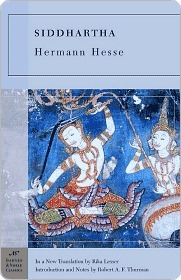More on this book
Community
Kindle Notes & Highlights
‘What is meditation? What is abandonment of the body? What is fasting? What is the holding of breath? It is a flight from the Self, it is a temporary escape from the torment of Self. It is a temporary palliative against the pain and folly of life. The driver of oxen makes this same flight, takes this temporary drug when he drinks a few bowls of rice wine or coconut milk in the inn. He then no longer feels his Self, no longer feels the pain of life; he then experiences temporary escape. Falling asleep over his bowl of rice wine, he finds what Siddhartha and Govinda find when they escape from
...more
· Flag
Rick-Phil
On the way, Govinda said: ‘Siddhartha, you have learned more from the Samanas than I was aware. It is difficult, very difficult to hypnotize an old Samana. In truth, if you had stayed there, you would have soon learned how to walk on water.’ ‘I have no desire to walk on water,’ said Siddhartha. ‘Let the old Samanas satisfy themselves with such arts.’
what is it that you wanted to learn from teachings and teachers, and although they taught you much, what was it they could not teach you? And he thought: It was the Self, the character and nature of which I wished to learn. I wanted to rid myself of the Self, to conquer it, but I could not conquer it, I could only deceive it, could only fly from it, could only hide from
Truly, nothing in the world has occupied my thoughts as much as the Self, this riddle, that I live, that I am one and am separated and different from everybody else, that I am Siddhartha; and about nothing in the world do I know less than about myself, about Siddhartha.
I will learn from myself, be my own pupil; I will learn from myself the secret of Siddhartha.
Nothing is caused by demons; there are no demons. Everyone can perform magic, everyone can reach his goal, if he can think, wait and fast.’
Most people, Kamala, are like a falling leaf that drifts and turns in the air, flutters, and falls to the ground. But a few others are like stars which travel one defined path: no wind reaches them, they have within themselves their guide and path.
Slowly the soul sickness of the rich crept over him.
old. In the same way it lost its colour and sheen with the passing of the years: creases and stains accumulated and, hidden in the depths, here and there already appearing, waited disillusionment and nausea.
This despair, this extreme nausea which he had experienced had not overpowered him. The bird, the clear spring and voice within him was still alive — that was why he rejoiced, that was why he laughed, that was why his face was radiant under his grey hair.
He was pleased with everything that he did and learned and the days and months passed quickly. But he learned more from the river than Vasudeva could teach him. He learned from it continually. Above all, he learned from it how to listen, to listen with a still heart, with a waiting, open soul, without passion, without desire, without judgement, without opinions.
They both listened silently to the water, which to them was not just water, but the voice of life, the voice of Being, of perpetual Becoming.
The men of the world were equal to the thinkers in every other respect and were often superior to them, just as animals in their tenacious undeviating actions in cases of necessity may often seem superior to human beings.
‘When someone is seeking,’ said Siddhartha, ‘it happens quite easily that he only sees the thing that he is seeking; that he is unable to find anything, unable to absorb anything, because he is only thinking of the thing he is seeking, because he has a goal, because he is obsessed with his goal. Seeking means: to have a goal; but finding means: to be free, to be receptive, to have no goal.
Wisdom is not communicable. The wisdom which a wise man tries to communicate always sounds foolish.’
Knowledge can be communicated, but not wisdom. One can find it, be fortified by it, do wonders through it, but one cannot communicate and teach it.
I learned through my body and soul that it was necessary for me to sin, that I needed lust, that I had to strive for property and experience nausea and the depths of despair in order to learn not to resist them, in order to learn to love the world, and no longer compare it with some kind of desired imaginary world, some imaginary vision of perfection, but to leave it as it is, to love it and be glad to belong to it.
Words do not express thoughts very well. They always become a little different immediately they are expressed, a little distorted, a little foolish. And yet it also pleases me and seems right that what is of value and wisdom to one man seems nonsense to another.’


